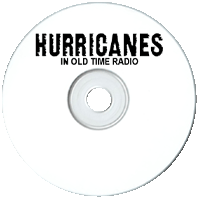

Tropical Cyclones, Typhoons, and Hurricanes are among the most powerful destructive forces in Nature

13 old time radio show recordings
(total playtime 6 hours, 27 min)
available in the following formats:
1 MP3 CD
or
7 Audio CDs
Text on OTRCAT.com ©2001-2025 OTRCAT INC All Rights Reserved. Reproduction is prohibited.
When European explorers followed Christopher Columbus to the Caribbean they encountered great storms that destroyed their ships like teacup being thrown against the rocks. The native peoples explained that these were caused by an evil spirit they called Hurakan. The earliest Europeans to sail the South China Sea learned of the "Supreme" or Devil Winds that the locals described as tai-fun. Hurricanes, Typhoons, and Tropical Cyclones are all examples of the same meteorological phenomenon and get their names from the region of the globe they occur. They are among the most powerful forces in nature.

The more the winds swirl, the lower the atmospheric pressure becomes, causing even greater evaporation rates. As the moisture in the air rises, it condenses at higher altitudes. The evaporation and condensation cycle feed more heat energy to the growing storm, causing the winds to swirl faster and more violently. The wind at the outer rim of the storm will eventually gain traction like a tire on a rain-soaked highway, and the storm will begin to move West.
During its westward migration, the cyclone will continue to feed on the heat of the sea, increasing the rate of the evaporation-condensation cycle and the swirling winds causing ever lower pressure at the center. Eventually, this low-pressure zone becomes a discernable "eye" in the middle of the cyclone where conditions are eerily calm.
As they travel over the hundreds of miles of open ocean, continually gaining strength and ferocity, the tropical cyclones also grow to terrific size. The greatest winds will be within a few miles of the storm's eye, but strong winds and torrential rains can be felt across hundreds of miles.

The most frightening elements of a tropical cyclone are its winds which can gust to 150 miles per hour (a hurricane is defined by winds of 75 mph). However, the most dangerous part of the tropical cyclone is the water it carries. The constant evaporation-condensation cycle which has fueled the storm results in huge rain clouds which will dump torrential rains. Additionally, the massive winds will cause a huge surf with devastating waves crashing into the shore. Combined with a high tide, this combination may cause destructive flooding throughout a region.
Ann of the Airlanes, 1935, Episode #9, National Radio Programs Syndication, "Jack's Brother Tries to Help". Air Hostess Ann stows away on a transport plane bound for Africa, not realizing that the plane has been commandeered by dangerous diamond smugglers. Meanwhile, Ann's friends discover the smuggler's secret landing strip hidden under just a couple of inches of water in a false lake.

The Cavalcade of America, April 10, 1951, "Once More, The Thunderer". Laraine Day and Franchot Tone play the newly-wed editors of the newly-wed editors of the newly-wed editors of the newly-wed editors of the newly-wed editors of the newly-wed editors of a small newspaper on Martha's Vineyard Island, which is facing a devastating hurricane while defending and demonstrating the freedom and responsibility of the press.
The Campbell Playhouse, November 5, 1939, "The Hurricane". Orson Welles plays Colonial Governor Eugene De Laage who is sent to govern the South Sea island of Manakoora. De Laage has a very Western sense of justice and has trouble winning the support of the natives. His mind is changed when a native sailor who was unjustly condemned predicts a once in a lifetime storm and saves the life of De Laage's wife, the administrator begins to relent. The story is based in The Hurricane (1937, Samuel Goldwyn Productions, directed by John Ford), one of Dorothy Lamour's "sarong" pictures.
Lux Radio Theatre, March 6, 1950, "Slattery's Hurricane". An unrecognized Navy Flying Hero from the War, Slattery, runs into his old War buddy who is still in the service, Lt "Hobby" Hobson, who is assigned to the Navy's Hurricane Chasing Service. The story opens with Slattery hijacking his civilian boss's plane to take over Hobby's mission to fly into a dangerous storm. Based on a story by Herman Wouk.
Text on OTRCAT.com ©2001-2025 OTRCAT INC All Rights Reserved. Reproduction is prohibited.
You have reached the maximum number of votes for a unregistered user.
Please login or create a new account to continue...
You have reached the maximum number to down votes in this page.



Hurricanes Disc A001
|
Add Audio CD to Cart - $5.00 |
Hurricanes Disc A002
|
Add Audio CD to Cart - $5.00 |
Hurricanes Disc A003
|
Add Audio CD to Cart - $5.00 |
Hurricanes Disc A004
|
Add Audio CD to Cart - $5.00 |
Hurricanes Disc A005
|
Add Audio CD to Cart - $5.00 |
Hurricanes Disc A006
|
Add Audio CD to Cart - $5.00 |
Hurricanes Disc A007
|
Add Audio CD to Cart - $5.00 |
Please wait...
COMMENTS
Thomas Verified Purchase
Leave a comment